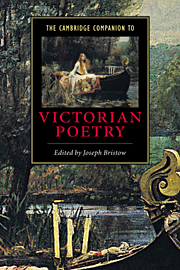Book contents
- Frontmatter
- 1 Reforming Victorian poetry: poetics after 1832
- 2 “The Lady of Shalott” and the critical fortunes of Victorian Poetry
- 3 Experimental form in Victorian poetry
- 4 The dramatic monologue
- 5 Victorian meters
- 6 Victorian poetry and historicism
- 7 Victorian poetry and science
- 8 Victorian poetry and religious diversity
- 9 The Victorian poetess
- 10 The poetry of Victorian masculinities
- 11 Aesthetic and Decadent poetry
- 12 Victorian poetry and patriotism
- 13 Voices of authority, voices of subversion: poetry in the late nineteenth century
- Glossary
- Guide to Further Reading
- Index
12 - Victorian poetry and patriotism
Published online by Cambridge University Press: 28 May 2006
- Frontmatter
- 1 Reforming Victorian poetry: poetics after 1832
- 2 “The Lady of Shalott” and the critical fortunes of Victorian Poetry
- 3 Experimental form in Victorian poetry
- 4 The dramatic monologue
- 5 Victorian meters
- 6 Victorian poetry and historicism
- 7 Victorian poetry and science
- 8 Victorian poetry and religious diversity
- 9 The Victorian poetess
- 10 The poetry of Victorian masculinities
- 11 Aesthetic and Decadent poetry
- 12 Victorian poetry and patriotism
- 13 Voices of authority, voices of subversion: poetry in the late nineteenth century
- Glossary
- Guide to Further Reading
- Index
Summary
For literary critics who anticipated or experienced the devastation of the First World War, there was something peculiarly “Victorian” - and peculiarly suspect - about patriotic poetry. By 1910, even Hugh Walker, who had devoted several pages of The Greater Victorian Poets (1895) to praise Alfred Tennyson's patriotic writing, judged Victoria's former Poet Laureate as “too prone to echo back the thoughts of his own time and country” - and thus, suggestively, as an ideological ally of Germany. “Patriotism is good,” wrote Walker, “but it is not a pure good when there goes with it a hard, unsympathetic tone of mind towards other races; and in Tennyson we hear rather too much of 'the blind hysterics of the Celt,' and 'the red fool-fury of the Seine.' He lived under the sway of the Teutonic idea, and already the Teutonic idea is discredited.”
“An Englishman taking himself seriously,” G.K. Chesterton wrote of Tennyson in 1913, was “an awful sight.” Such claims were not entirely tongue-in-cheek, as Virginia Woolf's To the Lighthouse (1927) underscores. In Woolf's novel, as Mr. Ramsay begins to declaim Tennyson’s famous “Charge of the Light Brigade” (1854) in a voice “between a croak and a song,” what was “ridiculous” suddenly becomes “alarming.” Shouting “Boldly we rode and well” (AT 23), Ramsay charges his guest Lily Briscoe, nearly overturning her easel - and with it, the art that stands at the novel's center.
- Type
- Chapter
- Information
- The Cambridge Companion to Victorian Poetry , pp. 255 - 279Publisher: Cambridge University PressPrint publication year: 2000
- 6
- Cited by

